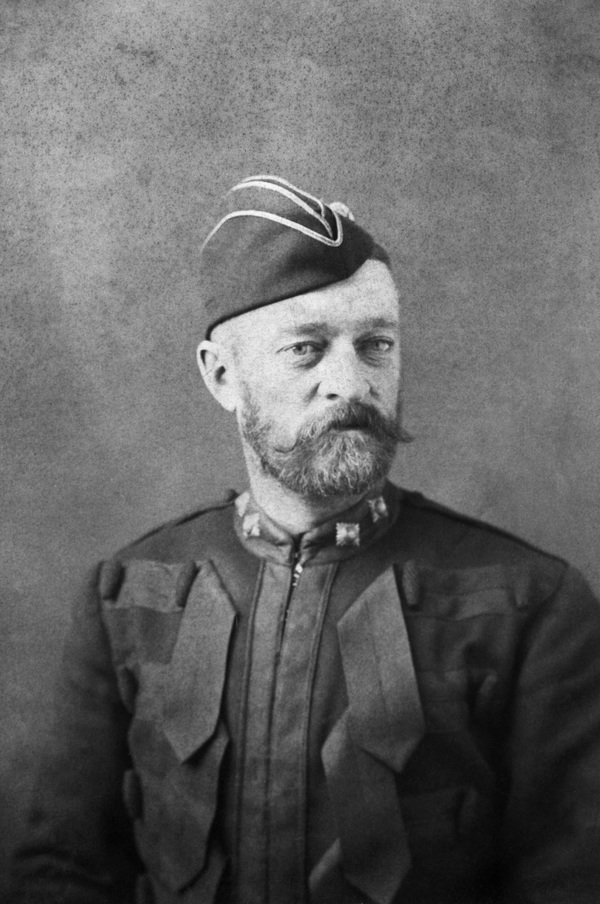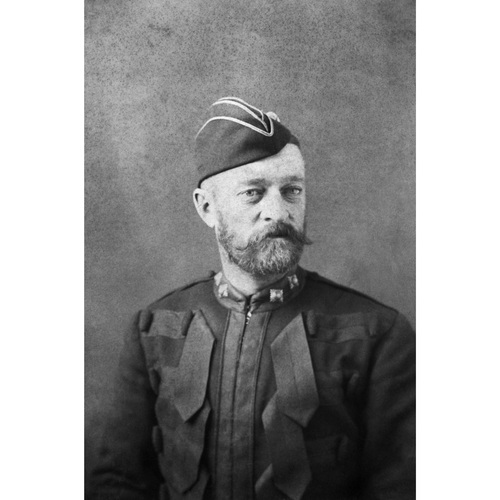
Source: Link
HERCHMER, WILLIAM MACAULEY (although his middle name is often spelled Macaulay, he signed Macauley), lawyer, militia officer, and NWMP officer; b. 13 Dec. 1844 in Shipton-on-Cherwell, England, son of the Reverend William Macaulay Herchmer and Frances Turner; m. Eliza H. Rose, and they had two daughters; d. 1 Jan. 1892 in Calgary.
William Macauley Herchmer came from a prominent loyalist family; his great-grandfather Johan Jost Herkimer served with Butler’s Rangers and settled at Cataraqui (Kingston, Ont.) in 1783. His father, a friend and schoolmate of John A. Macdonald’s, received his university education at Oxford and became an Anglican clergyman. Although the family lived in Kingston, the Reverend Mr Herchmer insisted that his children be born in England. His long-suffering wife dutifully made the arduous journey across the Atlantic for the birth of each of her nine children.
William Macauley and his brothers were sent to school at Henley-on-Thames, England. When his father died in 1862 he returned to Upper Canada and studied law at Osgoode Hall, Toronto, passing his junior examinations in 1863. He then went back to Kingston to article in and practise law. Like many other young business and professional men, he sought relief from the tedium of office routine in the local militia. By 1869 he had risen to the rank of major in the Princess of Wales’s Own Regiment. The following year he joined the expeditionary force under Colonel Garnet Joseph Wolseley* sent to quell the troubles in the Red River settlement (Man.) and he was given command of a company in the 1st (Ontario) Battalion of Rifles. Although he resumed his law practice in Kingston, he seems to have been impressed by the opportunities available in the northwest because he returned to Winnipeg and was admitted to the Manitoba bar in October 1871.
In August 1876 Herchmer was appointed superintendent in the North-West Mounted Police. For his first four years he was in charge of the detachment at Shoal Lake, a quiet post near the present Manitoba–Saskatchewan border, which had as its main function the prevention of liquor importation along the Carlton Trail. In 1880 he was transferred to Battleford (Sask. ), at the centre of a rising tide of discontent among the Plains Cree. Herchmer was not unsympathetic to the plight of the Indians but he had rigid ideas about enforcement of the law. These, combined with his total lack of fear, gave rise to alarming confrontations. While he was at Battleford, he and Superintendent Lief Newry Fitzroy Crozier* commanded the escort for the western tour of the governor general, the Marquess of Lorne [Campbell*], in 1881.
In 1883 Herchmer was moved to the new headquarters of the NWMP at Regina. There he was in charge of the detachments assigned to guard Canadian Pacific Railway property during a strike by engineers and firemen. In the spring of 1884 he was sent to Calgary to take command of E division. A year later, when the North-West rebellion broke out, he and some of his men were ordered to Swift Current (Sask.), where they joined Lieutenant-Colonel William Dillon Otter*’s column and went to the relief of Battleford on 24 April. On 2 May at the battle of Cut Knife Hill the 74 police under Herchmer made up almost a quarter of Otter’s force. Although the attack against the Plains Cree [see Pītikwahanapiwīyin*] was unsuccessful, Herchmer and the NWMP received high praise from Otter for their performance in the fighting.
On 1 April 1886 Herchmer’s older brother, Lawrence William*, took over as commissioner of the NWMP. Three months later he promoted William Macauley assistant commissioner. Even though William was the senior superintendent in the force and was well qualified for the position, the promotion unfortunately had a flavour of nepotism. Perhaps for this reason William Macauley’s first year as assistant commissioner was spent in a relentless round of activity. In that year he visited every NWMP post, travelling more than 15,000 miles by rail, water, horse, and snowshoe. This energetic approach to his work characterized the rest of his career. Unlike his dour brother, he remained popular both within the NWMP and outside it.
In the early hours of New Year’s Day 1892 Herchmer suffered a heart attack and died. His funeral was reported to be the largest yet seen in Calgary. He left no great personal imprint on the NWMP, but, in his background and attitudes, he was typical of the officers who led the force in its formative years.
NA, RG 18, G, 3436, no.37. QUA, 2253. Daily Free Press (Winnipeg), 4 Jan. 1892. Fort Macleod Gazette (Fort Macleod, Alta.), 7 Jan. 1892. A. M. Machar, The story of old Kingston (Toronto, 1908). R. C. Macleod, The NWMP and law enforcement, 1873–1905 (Toronto, 1976). Turner, NWMP. “Commissioner L. W. Herchmer, 1886–1900,” RCMP Quarterly ([Ottawa]), 2 (1935), no.4: 4–8. D. B. Smith, “The Herchmers’ secret,” Beaver, outfit 310 (spring 1980): 52–58.
Cite This Article
R. C. Macleod, “HERCHMER, WILLIAM MACAULEY (Macaulay),” in Dictionary of Canadian Biography, vol. 12, University of Toronto/Université Laval, 2003–, accessed April 29, 2025, https://www.biographi.ca/en/bio/herchmer_william_macauley_12E.html.
The citation above shows the format for footnotes and endnotes according to the Chicago manual of style (16th edition). Information to be used in other citation formats:
| Permalink: | https://www.biographi.ca/en/bio/herchmer_william_macauley_12E.html |
| Author of Article: | R. C. Macleod |
| Title of Article: | HERCHMER, WILLIAM MACAULEY (Macaulay) |
| Publication Name: | Dictionary of Canadian Biography, vol. 12 |
| Publisher: | University of Toronto/Université Laval |
| Year of revision: | 1990 |
| Access Date: | April 29, 2025 |



